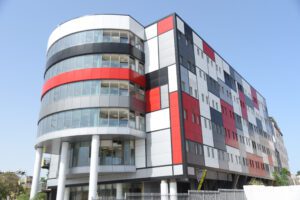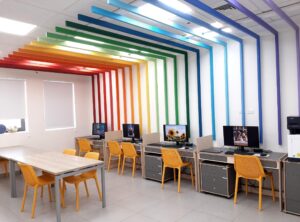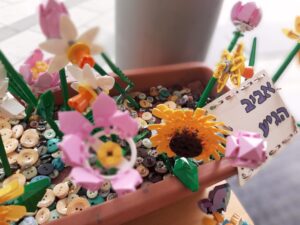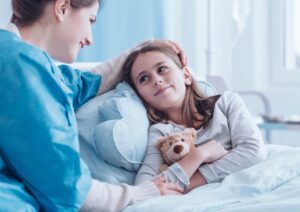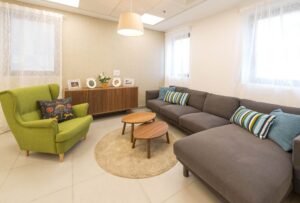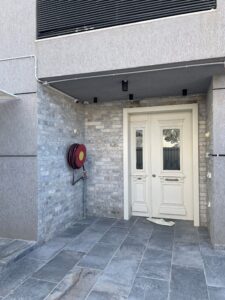Professor Somekh has a rich track record and is considered one of the top senior pediatricians in Israel. The Pediatric Wing provides a full range of services such as pediatric emergency care, pediatric inpatient wards, pediatric surgery, ENT, orthopedics, neurology, and more.
“Children are joy,” true. And healthy children, even more so. Mayanei Hayeshua Medical Center’s Pediatric Division has expanded and is now a full wing containing a number of separate wards, some of them new – such as the Pediatric Emergency Room. The Pediatric Wing will be directed by Professor Eli Somekh, a noted pediatrician who is considered one of the top in his field in Israel and abroad. The current Pediatric Ward will continue to be directed by Dr. Yoram Ben-Yehuda.
Professor Somekh’s experience spans decades. He is 66 years old, a resident of Givatayim, and is extremely familiar and appreciative of the Haredi community.
Somekh’s father was also a doctor, and he was drawn to the medical field from a very young age. In 1977, Somekh completed his studies at Tel Aviv University, moved on to his internship at Wolfson Medical Center, and then traveled abroad for a 3.5-year internship in the Pediatric Medical Center in Denver, Colorado. Upon his return, he was hired as a senior pediatrician in Wolfson and quickly began climbing up the hierarchy ladder as he was appointed manager of the Pediatric Ward, and then manager of the entire Pediatric Array.
When asked about his choice of field, Prof. Somekh gives a soft smile. “[I chose pediatrics] because of the direct contact with the children, which offers an immediate reward – the children’s smiles, their health. The pediatric field is also a kind of optimistic medicine, with a very strong connection to the child and his family. Even today, I enjoy the direct contact that I have with the children and try to bring them healing for the problem that they are facing at a young age, at the peak of their blossoming.”
Alongside his work in Wolfson, Prof. Somekh served, and continues to serve, in a number of important positions in pediatric medicine. Until only a few short months ago, he served for four years as Chairman of the Israeli Association of Pediatric Medicine, which boasts over 3,000 members. He was elected by a landslide. Currently, Prof. Somekh is a member of the Scientific Committee of the European Pediatric Association.
This is not his only role. The renowned professor was also invited by the Ministry of Health to join a number of highly respectable committees. He is a member of the Advisory Committee on Infectious Diseases and Immunization, as well as Chairman of the Committee for Recommendations on the Functions of the Tipot Chalav [Baby Well-Visit Clinics] in Israel. Following an outbreak of polio disease in 2013, the Ministry of Health elected him to head the Polio Committee.
“Familiar with the Unique Needs and Dilemmas”
In an interview that took place in between caring for a patient and running to a staff meeting, Prof. Somekh told us a bit about his experience: “I have a private clinic on the border of Bnei Brak and Ramat Gan, and that was the beginning of my close relationship with the Haredi community. I am very familiar with this population’s unique needs and dilemmas.” He explained that he was first introduced to Mayanei Hayeshua by Mrs. Rivka Shlezinger, who is responsible for collection and control at Mayanei Hayeshua. “She suggested that I consider it. I visited Mayanei Hayeshua, noticed the wonderful atmosphere and the commitment of the medical team, and decided to accept the job. I think Mayanei Hayeshua does wonderful work and really gives thousands of Torah-observant children each year the possibility of receiving top-quality treatment in a place that is commensurate with their lifestyles. I completely understand the families’ need to receive medical care in a place in which they feel comfortable – a friendly place that accepts their requests and provides what they need, and is considerate of their cultural needs and demands. This is an extremely important component of healing! Beyond the good feeling that it engenders, scientific literature has shown that a place like Mayanei Hayeshua, which provides the communal framework and familiar environment, can actually assist the healing process.”
Is there a difference in morbidity between Haredi and irreligious children?
“This is a very good question, to which there aren’t really any clear answers yet, since not much research has been done on the subject. However, we can say that Haredi children are exposed to infectious diseases earlier.
“There may be two possible reasons for this: the fact that in this population, children begin attending daycare programs at a younger age, and the fact that they have more siblings. This is something that I would definitely want to find out and look into. Sometimes, by working in a hospital such as Mayanei Hayeshua which focuses on a specific population, you can learn about the medical needs that characterize this particular community on a greater level.”
In what way is the Pediatric Ward for religious children different than its secular counterpart?
“In the separation between boys and girls, for example – something which is completely legitimate and acceptable in my eyes. My personal opinion is that in times of difficulty or weakness, people need to feel that they are in their natural surroundings. Taking a boy or a girl from a Haredi home and putting them into a medical center with a completely different set of laws than what they are used to can be problematic. This is precisely the time when they need to feel comfortable and experience a familiar atmosphere. And the same is true for their families.”
Mayanei Hayeshua: The Importance of a Community-Focused Hospital
Prof. Somekh brings another example of the importance of the community factor that is a focus at Mayanei Hayeshua Medical Center: “Eating disorders require an approach that takes into consideration all the small details, such as the community [the patient belongs to]. The patient’s chance of healing and improvement will be greatest in a place where they feel at home.”
From your short experience at Mayanei Hayeshua, what do you think of the Medical Center?
“I see the strong motivation here, the desire of the entire medical team to contribute to the success, and the importance of being attentive to the community’s needs. These are things that you don’t see everywhere. There are wonderful things here. There is a magnificent neonatal unit, a fabulous delivery room, and great foundations for the emergency and pediatric departments, too, which we should reinforce. In order to build additional wards and augment the medical service, we need to strengthen the foundations. The goal is to provide additional medical services in what we call the “super-fields”: pediatric kidney and lung care, and more, so that we can address all needs. Currently, the Haredi community’s demand is to receive from Mayanei Hayeshua everything that the medical world has to offer, and we want to reach a point in which the majority of the children’s needs are provided here, by us.”
In conclusion, Professor Somekh says that he “view[s] it as an exciting challenge to build a system for the children and adolescents of Bnei Brak that will provide for all their requirements and issues. They will be able not only to feel at home, but also to be proud of this place.”



